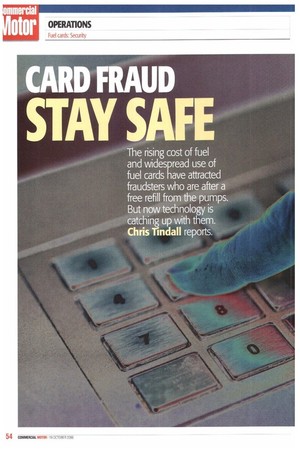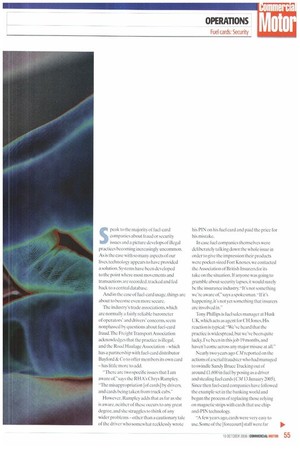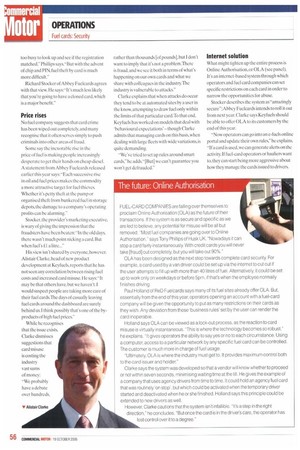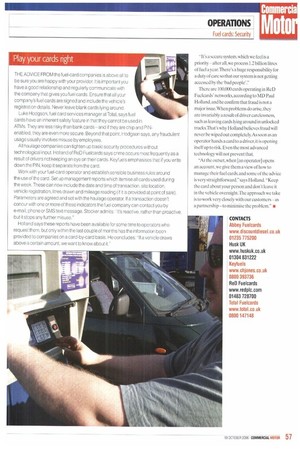CAR FRAUD STAY SAFE
Page 54

Page 55

Page 56

Page 57

If you've noticed an error in this article please click here to report it so we can fix it.
The rising cost of fuel and widespread use of fuel cards have attracted fraudsters who are after a
free refill from the pumps. But now technology is
catching up with them.
Chris Tindall reports. . S peak to the majority of fuel-card companies about fraud or security issues and a picture develops of illegal
practices becoming increasingly uncommon. As is the case with so many aspects of our lives, technology appears to have provided a solution. Systems have been developed to the point where most movements and transactions are recorded.tracked and fed back to a central database.
And in the case of fuel-card usage. things are about to become even more secure.
The industry's trade associations, which are normally a fairly reliable barometer of operators' and drivers' concerns, seem nonplussed by questions about fuel-card fraud.The Freight Transport Association acknowledges that the practice is illegal, and the Road Haulage Association —which has a partnership with fuel-card distributor Bayford & Co to offer members its own card — has little more to add.
"There are two specific issues that! am aware of," says the RHA's Chrys Ratnpley. -The misappropriation [of cards] by drivers, and cards being taken from truck cabs." However, Rampley adds that as far as she is aware, neither of these occurs to any great degree, and she struggles to think of any wider problems —other than a cautionary tale of the driver who somewhat recklessly wrote
his PIN on his fuel card and paid the price for his mistake.
In case fuel companies themselves were deliberately talking down the whole issue in order to give the impression their products were pocket-sized Fort Knoxes, we contacted the Association of British Insurers for its take on the situation. If anyone was going to grumble about security lapses, it would surely be the insurance industry."It's not something we're aware of," says a spokesman.-If it's happening, it's not yet something that insurers are involved in."
Tony. Phillips is fuel sales manager at Husk UK, which acts as agent for CH Jones. His reaction is typical:"We've heard that the practice is widespread,but we've been quite lucky. I've been in this job 19 months, and haven't come across any major misuse at all."
Nearly two years ago CM reported on the actions of a serial fraudster who had managed to swindle Sandy Bruce 'Bucking out of around £1,600 in fuel by posing as a driver and stealing fuel cards (CM 13 January 2005). Since then fuel-card companies have followed the example set in the banking world and begun the process of replacing those relying on magnetic strips with cards that use chipand-PIN technology. "A few years ago, cards were very easy to use. Some of the [forecourt] staff were far
too busy to look up and see if the registration matched:. Phillips says. "But with the advent of chip and PIN, fuel theft by card is much more difficult."
Richard Stocker of Abbey Fuelcards agrees with that view. He says:"It's much less likely that you're going to have a cloned card, which is a major benefit."
Price rises
No fuel company suggests that card crime has been wiped out completely, and many recognise that it often serves simply to push criminals into other areas of fraud. Some say the inexorable rise in the
price of fuel is making people increasingly desperate to get their hands on cheap diesel. A statement from Abbey Fuelcards released earlier this year says:"Each successive rise in oil and fuel prices makes the commodity a more attractive target for fuel thieves. Whether it's petty theft at the pump or organised theft from bunkered fuel in storage depots, the damage to a company's operating profits can be alarming."
Stocker, the provider's marketing executive, is wary of giving the impression that the fraudsters have been beaten:" In the old days, there wasn't much point nicking a card. But when fuel's fl a litre..."
His view isn't shared by everyone, however. Alistair Clarke, head of new product development at Keyfuels, reports that he has not seen any correlation between rising fuel costs and increased card misuse. He says:"It may be that others have, but we haven't. I would suspect people are taking more care of their fuel cards.The days of casually leaving fuel cards around the dashboard are surely behind us. I think possibly that's one of the byproducts of high fuel prices." While he recognises that the issue exists, Clarke dismisses suggestions that card misuse is costing the industry vast sums of money: "We probably have a debate over hundreds,
rather than thousands [of pounds], but I don't want to imply that it's not a problem.There is fraud, and we see it both in terms of what's happening on our own cards and what we share with colleagues in the industry. The industry is vulnerable to attacks."
Clarke explains that when attacks do occur they tend to heat automated sites by a user in the know, attempting to draw fuel only within the limits of that particular card.To that end, Keyfuels has worked on models that deal with 'behavioural expectations' — though Clarke admits that managing cards on this basis, when dealing with large fleets with wide variations, is quite demanding.
"We've tried to set up rules around smart cards," he adds. "[But] we can't guarantee you won't get defrauded."
Internet solution
What might tighten up the entire process is Online Authorisation,or OLA (see panel). It's an internet-based system through which operators and fuel card companies can set specific restrictions on each card in order to narrow the opportunities for abuse.
Stocker describes the system as "amazingly secure"; Abbey Fuelcards intends to roll it out from next year. Clarke says Keyfuels should be able to offer OLA to its customers by the end of this year.
"Now operators can go into an e-fuels online portal and update their own rules," he explains. "If a card is used, we can generate alerts on the activity. If fuel-card operators or hauliers want to, they can start being more aggressive about how they manage the cards issued to drivers.
-It's a secure system.which we feel is a priority after all ,we process 1.2 billion litres of fuel a year.There's a huge responsibility for a duty of care so that our system is not getting accessed by the had people'."
There are 100,000 cards operating in ReD Fuelcards' networks, according to MD Paul Holland,and he confirm that fraud is not a major issue. When problems do arise, they are invariably a result of driver carelessness, such as leaving cards lying around in unlocked trucks.That's why Holland believes fraud will never he wiped out completely. As soon as an operator hands a card to a driver, it is opening itself up to risk. Even the most advanced technology will not prevent that. "At the outset, when [an operator] opens an account, we give them a view of how to manage their fuel cards, and some of the advice is very straightforward," says Holland. "Keep the card about your person and don't leave it in the vehicle overnight.The approach we take is to work very closely with our customers-as a partnership to minimise the problem." •
The future: Online Authorisation
FUEL-CARD COMPANIES are falling over themselves to proclaim Online Authorisation (OLA) as the future of their transactions. lithe system is as secure and specific as we are led to believe, any potential for misuse will be all but removed. "Most fuel companies are going over to Online
Authorisation." says Tony Phillips of Husk UK. "Nowadays it can stop a card fairly instantaneously. With credit cards you will never take [fraud] out completely, but you will take out 90%."
OLA has been designed as the next step towards complete card security. For example, a card used by a van driver could be set up via the internet to cut out if the user attempts to fill up with more than 40 litres of fuel. Alternatively, it could be set up to work only on weekdays or before 5pm, if that's when the employee normally finishes driving.
Paul Holland of ReD Fuelcards says many of its fuel sites already offer OLA. But, essentially from the end of this year, operators opening an account with a fuel-card company will be given the opportunity to put as many restrictions on their cards as they wish. Any deviation from these 'business rules' set by the user can render the card inoperable.
Holland says OLA can be viewed as a lock-out process, as the reaction to card misuse is virtually instantaneous. "This is where the technology becomes so robust," he explains. "It gives operators the ability to say yes or no to each circumstance. Using a computer, access to a particular network by any specific fuel card can be controlled. The customer is much more in charge of fuel usage.
"Ultimately, OLA is where the industry must get to. It provides maximum control both to the card issuer and holder."
Clarke says the system was developed so that a vendor will know whether to proceed or not within seven seconds, minimising waiting time at the till. He gives the example of a company that uses agency drivers from time to time. It could hold an agency fuel card that was routinely 'on stop', but which could be activated when the temporary driver started and deactivated when he or she finished. Holland says this principle could be extended to new drivers as well. However, Clarke cautions that the system isn't infallible. "It's a step in the right direction," he concludes. "But once the card is in the driver's care, the operator has
Play your cards right
THE ADVICE FROM the fuel-card companies is above all to be sure you are happy with your provider. It is important you have a good relationship and regularly communicate with the company that gives you fuel cards. Ensure that all your company's fuel cards are signed and include the vehicle's registration details. Never leave blank cards lying around. Luke Hodgson, fuel card services manager at Total, says fuel cards have an inherent safety feature in that they cannot be used in ATMs. They are less risky than bank cards-and if they are chip and PIN
enabled, they are even more secure. Beyond that point, Hodgson says, any fraudulent usage usually involves misuse by employees.
All haulage companies can tighten up basic security procedures without technological input. Holland of ReD Fuelcards says crime occurs most frequently as a result of drivers not keeping an eye on their cards. Keyfuels emphasises that if you write down the PIN, keep it separate from the card.
Work with your fuel-card operator and establish sensible business rules around the use of the card. Set up management reports which itemise all cards used during the week. These can now include the date and time of transaction, site location, vehicle registration, litres drawn and mileage reading (if it is provided at point of sale). Parameters are agreed and set with the haulage operator. If a transaction doesn't concur with one or more of these indicators the fuel company can contact you by e-mail, phone or SMS text message. Stocker admits: -It's reactive, rather than proactive, but it stops any further misuse."
Holland says these reports have been available for some time to operators who request them, but only within the last couple of months has the information been provided to companies on a card-by-card basis. He concludes: "If a vehicle draws above a certain amount, we want to know about it."


























































































































































































